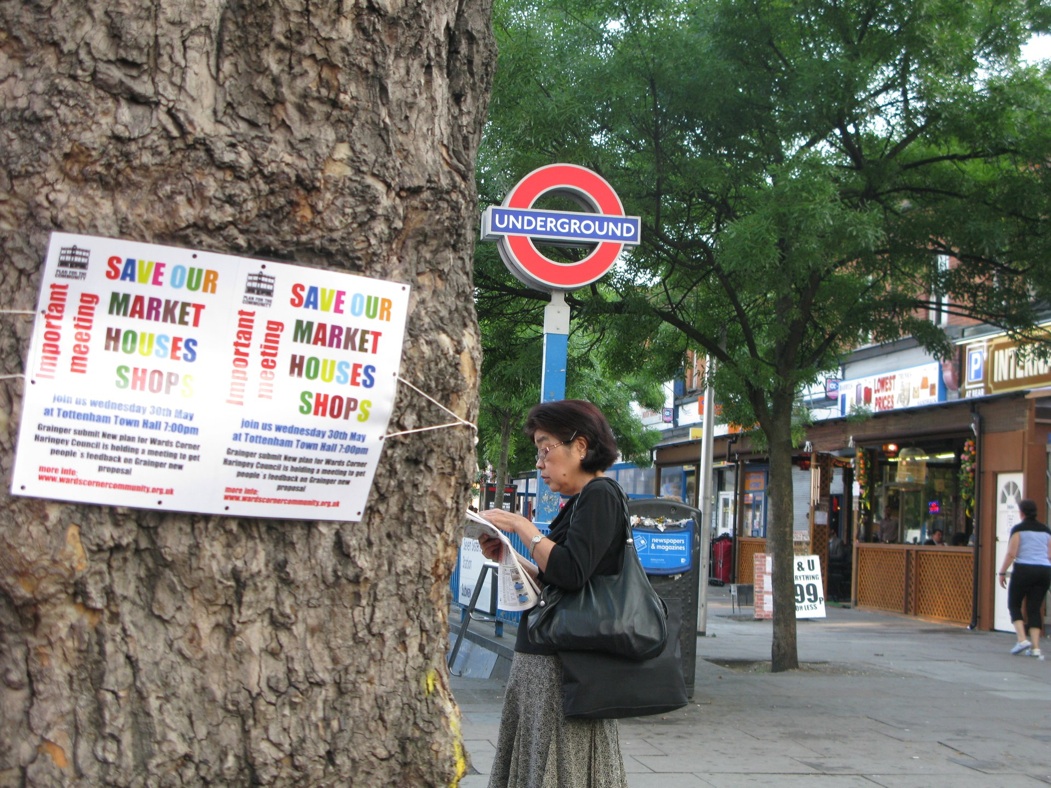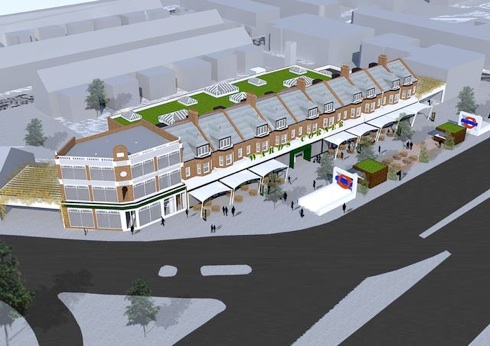As summer 2012 faded into autumn, the promised delivery of new jobs, homes and shops for a slice of Tottenham receded once again, writes Paul Coleman.
Two plans vied to ‘regenerate’ Wards Corner, part of the Seven Sisters neighbourhood of south Tottenham: a £65m plan developer-led plan, and a community plan led by local residents and traders.
Grainger secured planning consent in July 2012 to demolish Wards Corner and redevelop the site with 196 new homes for sale, shops and a revamped indoor market. None of the new homes will be ‘affordable’ or social rented (council). Haringey councillors narrowly voted in favour of the scheme on the recommendation of planning officers.
David Walters of developers Grainger said his company’s latest application based on a plan to demolish and re-develop Wards Corner - a landmark Seven Sisters building - would help regenerate the area. A new indoor market would replace the existing one.
Bitterly opposed
But the scheme, based on a 2007 development agreement between Haringey and Grainger, remains bitterly opposed by residents and Latin American, African, Asian and Caribbean market traders. The Wards Corner Community Coalition has applied to the High Court to seek a judicial review of Haringey’s approval.
In July 2012, the WCC publicly launched its own development plan that would restore and redevelop the Wards Corner department store building – and retain the existing indoor market. The market consists of 36 shop units, many rented by Spanish-speaking traders of Latin American origin.
Malti Patel, whose family has lived at Wards Corner and run their newsagents downstairs for over 27 years, said: "I will have nothing left if Grainger take away my home and business."
Wards Corner’s shops and cafés sit above north London’s busy Seven Sisters tube station. The area lies just south of homes and businesses in Tottenham badly hit by riots in August 2011.
Affordable and social homes
A viability test for Grainger’s plan concluded affordable housing was not viable. Social or council housing was not part of its plan.
The WCC says its plan ‘foresees a wider regeneration of the area creating new affordable housing’. By September, the WCC plan still awaited Council ‘validation’ to allow local people to be formally ‘consulted’.
Grainger’s David Walters said: “Simply refurbishing buildings will not provide a variety of shops for local residents. It will not be a catalyst for change and it will require millions of pounds of taxpayers’ money, which is not readily available,” said Walters. “We are ready to go and are keen to help regenerate Seven Sisters. We hope we can start soon.”
Consent challenged
On June 25, Walters and colleagues persuaded councillors on Haringey’s planning committee to vote 5-4 in favour of Grainger’s plan to build 196 new homes and shops at Wards Corner. The vote, taken at 12.45am after an arduous five-hour meeting typical of this 12-year saga, saw councillors narrowly accept a recommendation from council officers to approve Grainger’s plan, the second such Grainger plan to receive approval.
But in August the WCC, represented by Bindmans, formally notified Haringey Council of its legal challenge to the planning committee’s approval - the second time the WCC had legally challenged approval of a Grainger plan.
“We’re very disappointed the regeneration of Seven Sisters could be further delayed by legal challenge,” responded Haringey Council leader Claire Kober.
“We are disappointed that a small group protecting their own interests is seeking to prevent investment into Seven Sisters for the benefit of the whole community,” added Walters.
The WCC also asked Haringey to refrain from renewing its November 2005 development agreement with Grainger, at least until after the courts had dealt with the WCC’s legal challenge to the approval of Grainger’s plan.
Ongoing saga
Grainger’s redevelopment application for Wards Corner was the second to receive planning consent via a split planning committee vote. The original plan received consent in 2008. But the Court of Appeal quashed that approval in June 2010 after the WCC’s successful judicial review on grounds that Haringey Council had failed to discharge its duties - under Section 71 of the Race Relations Act 1976 - to consider the scheme’s impact on the area’s various ethnic groups, chiefly the market traders and local businesses.
Grainger and Haringey Council officers re-submitted the original plan with added ‘equalities impact assessments’. But this time councillors voted, again 5-4, to refuse consent in 2011, even though council officers had recommended approval. The delighted WCC supporters (above) contrasted with the dismayed expressions on the faces of Grainger and Haringey planning officers.
In 2012 Grainger sought to appeal to the government against this refusal whilst also producing its second revised plan. The government told Grainger it could not appeal against a decision on its first plan as ‘insurance’ against the possible failure of a second plan. Finally, it seemed, the first Grainger plan looked lost forever.
Helping market traders
But the second plan, backed now by London Mayor Boris Johnson, gained momentum. On 5 September, Walters heralded Mayor of London Boris Johnson for directing Transport for London, as Wards Corner’s main landowner, to pay Haringey Council £284,500 of taxpayers’ money to help indoor market traders “temporarily relocate” whilst Grainger demolish and rebuild Wards Corner.
Grainger said traders “will receive an additional £144,300 relocation assistance, a three month rent free period in the temporary market, like-for-like space and a 30% rent discount for 18 months in the new market”.
The Mayor’s direction stated: “The Pueblito Paisa Latin American Market provides a platform for small businesses and a specialist, culturally specific amenity for the local community”.
© Paul Coleman LONDON INTELLIGENCE 2012





